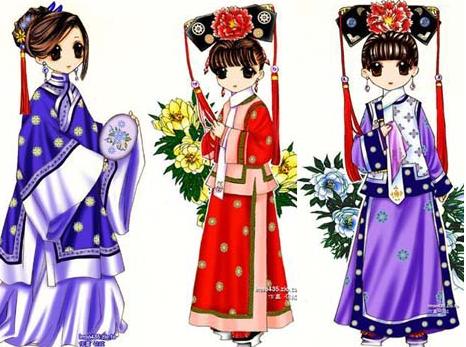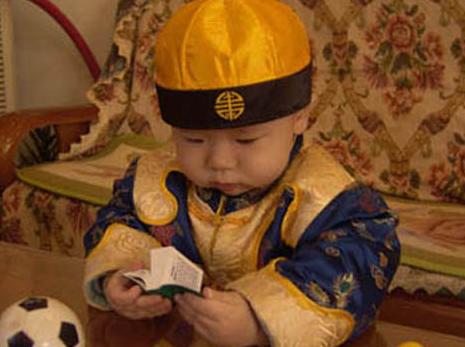
The history of the Man ethnic minority (also called the Manchu) dates back almost1, 400 years to the Sui (581 - 618) and Tang (618 - 907) Dynasties. The Man originated in the Jurchen tribes of north east China. Having established both the Jin (1115 - 1234) and Qing (1644 - 1911) Dynasties, this ethnic minority had tremendous influence on Chinese history.
The Manchu people assimilated many customs and ways of life of the Han majority during the Qing reign, but adhered to specific child rearing customs, some of which still hold sway.
Manchu people, in common with most ethnic groups, regarded a large family as a blessing, particularly one of many sons. Before the founding of the People's Republic of China, a Manchu family would hang a wooden bow on the left gate post to signify the birth of a boy and drape a red or blue strip of cloth over the right post if the baby was a girl.
It was customary to introduce a person outside of the immediate family, known as the caishengren, to the infant on the day it was born, in the belief he or she would take on their virtuous character and native intelligence. Adult caishengren were often regarded as the child's honorary father or mother. Another customs was inviting a mother unrelated to the family who had already produced several offspring, called the kainai, to breastfeed the child to meaning protected him or her from all evil and ensure a happy, healthy life.
A Manchu infant went through the xisan, or bathing ritual, on the third day after its birth. The family would invite a midwife or mother of adult offspring to bathe the baby in water in which locust tree branches and mugwort leaves had been boiled. As she washed the child she would chant: "Wash the head to be a prince; wash the face to be a governor; wash the waist to be superior to your ancestors." Friends present would then congratulate the family and throw copper cash, peanuts and eggs into the bath water to express their good wishes. The midwives then soaked a fresh strip of cotton in tea and rub the baby's gums. It was considered propitious if the baby cried lustily as guests at the ritual once more offered their felicitations.
When one-month-old the baby went through the zuomanyue ritual of being fed steamed, animal-shaped pieces of bread by its maternal grandmother, who would serve noodles to the rest of the family as a symbolic wish for the child's longevity.

The Manchu also share the zhuazhou ritual common among peoples of China. When the child is one-year-old its parents place a brush pen, work tool, abacus and, if the child is a girl, scissors, shears and a ruler within reach. Whichever item the child picks up is interpreted as an indication of his or her talents or future ambitions.
As the Manchu people regarded a flat head as a handsome feature, infants slept on a pillow filled with broomcorn and millet to shape its crown for the first three-to-four months of its life.
Another age-old sacred Manchu custom is that of a child "Wearing a Lock and Changing a Lock." The lock was a woven collar, a boy's in red and yellow thread, a girl's in blue and white. The ceremony was held in spring and autumn. A female Shaman brushed the infant's head with a willow branch and affixed the lock, which the child would wear until the next ceremony when she changed it for another lock.
During the 1950s it was common for rural Manchu children to wear a yizi, or length of hair long and loose at the back. It represented the family's wishes for the child's long, healthy, happy life.





